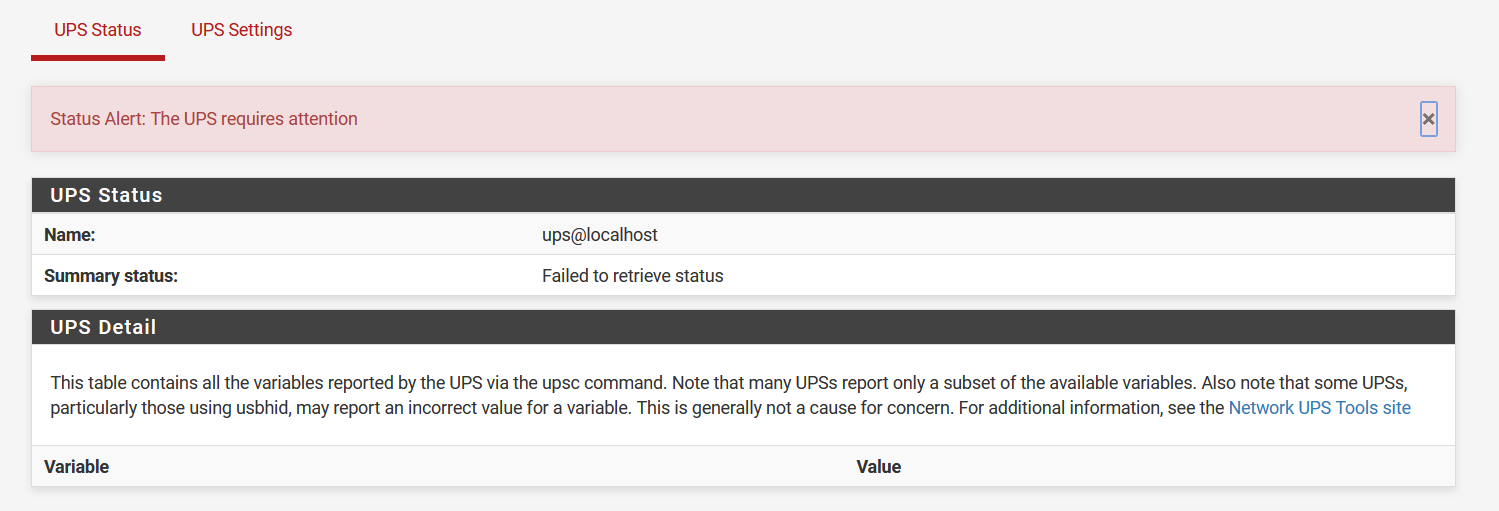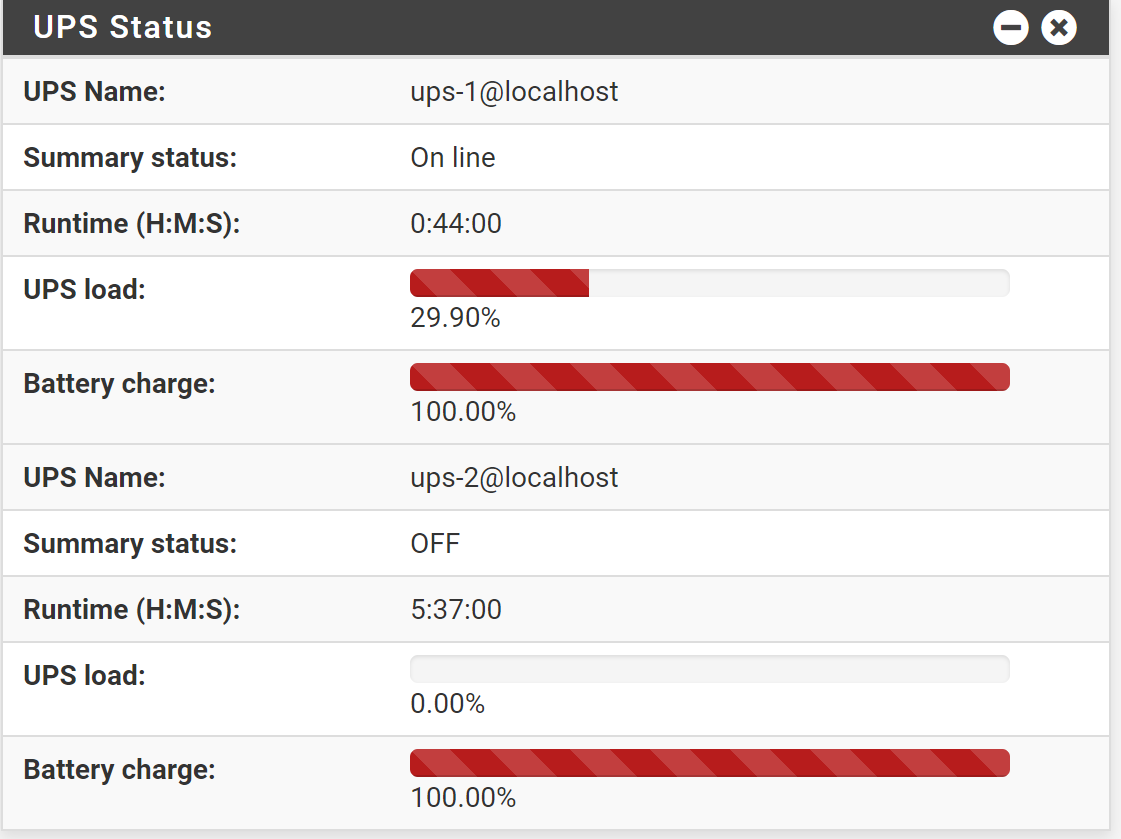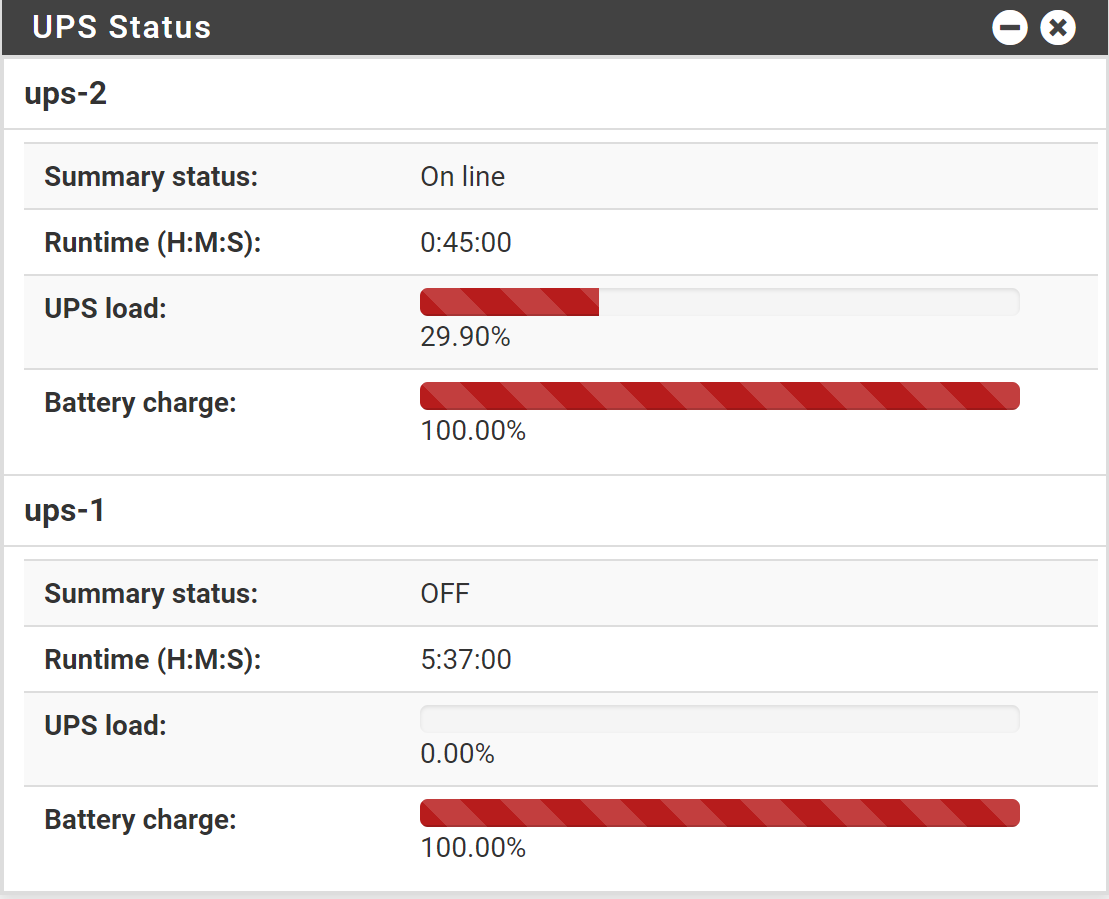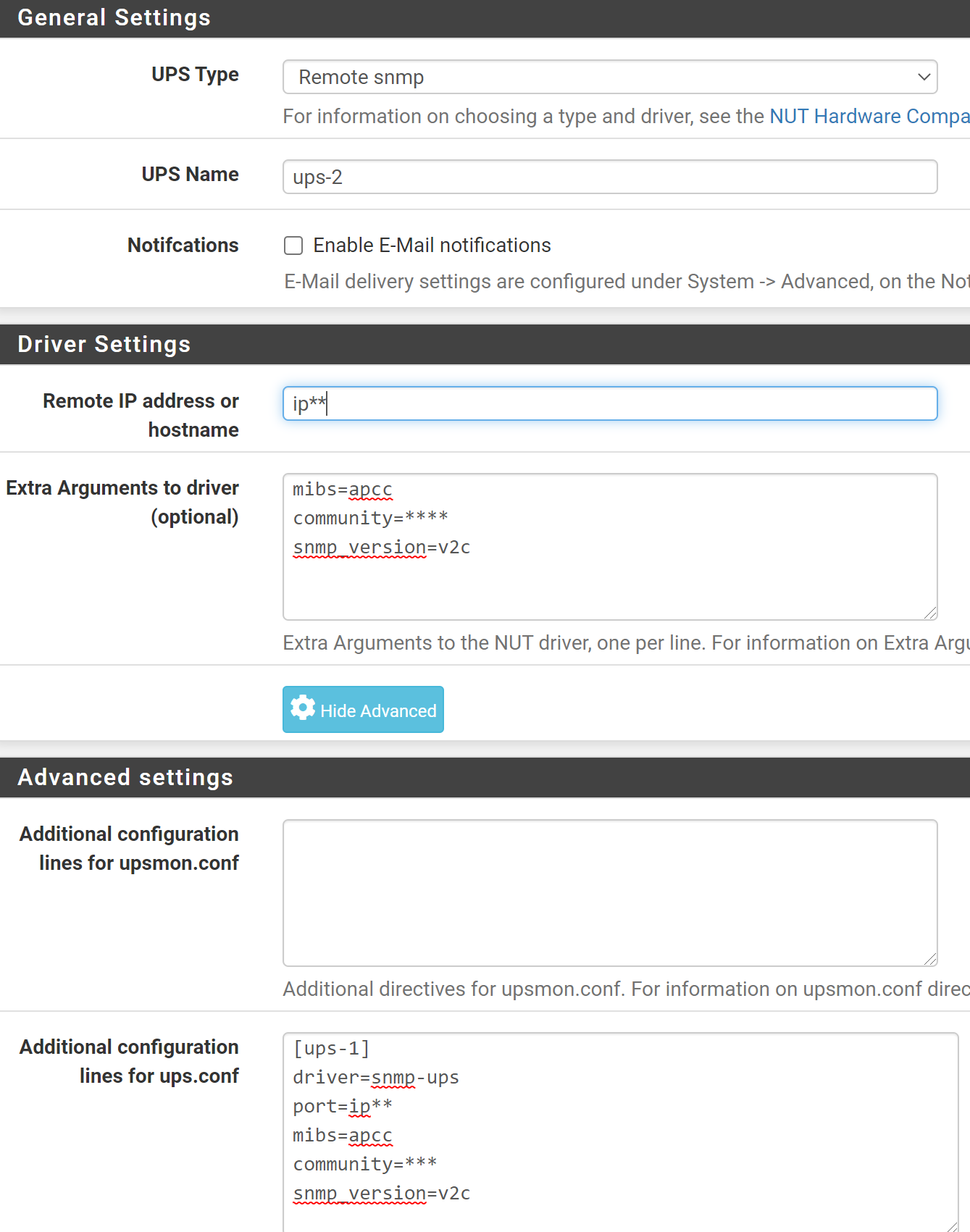-
@dennypage said in NUT package:
@kevindd992002 I don't think that some of the people writing in that thread know how NUT works.
The concept of a mode where the system is quiesced but is listening to the UPS and will start back up if the UPS signals that mains have returned is not supported with NUT. There is no concept of shutdown being started and subsequently aborted--when shutdown is started, is it expected to be completed through to the point of having the UPS cut the load.
Specifically to the Ramzi post (Synology support), he is saying that there is no way to have the Synology shut down but to leave the UPS powered. He is 100% correct in what he says. As noted above, this is exactly how NUT works. Once NUT shutdown is started, the UPS must be told to cut the load and remove power to the Synology.
If you prefer, you can use this phrasing instead of the prior:
Start a shutdown on the Synology and check the amount of time between the log off message in pfSense and the time the Synology actually enters safe mode.
This will probably be about a 1/4 second less than a power off test.

Right. I completely understand that this is not supported because I've experienced this myself. Sometimes, people in the house turn on the generator (when there's a blackout) a few seconds after the FSD is sent by NUT to the remote monitors. This messes up everything.
I think we're pertaining to the same thing but different wordings :)
I use "safe mode + Synology waits for UPS to cut power" which is exactly what the Synology support person was saying. If safe mode is just 1/4 second less than a full power off test, then doing a manual power off test would then be an accurate test. I did do this in the past and since I also have an expansion unit in the mix, I remember that both units turned off in the span of two to three minutes.
Would that value be a good value for the power off delay of the UPS then? I just need to make sure that the UPS has still enough juice to wait for that long.
-
@kevindd992002 said in NUT package:
Would that value be a good value for the power off delay of the UPS then? I just need to make sure that the UPS has still enough juice to wait for that long.
You’ll have to time it. Difference between NUT log off and entry to safe mode. My guess (hope) would be that it is significantly less 60 seconds, but that’s just a guess. Note that you’ll need to recheck whenever you make significant changes to the Synology.
Just out of curiosity, are you running DSM 6 or 7?
-
@dennypage said in NUT package:
@kevindd992002 said in NUT package:
Would that value be a good value for the power off delay of the UPS then? I just need to make sure that the UPS has still enough juice to wait for that long.
You’ll have to time it. Difference between NUT log off and entry to safe mode. My guess (hope) would be that it is significantly less 60 seconds, but that’s just a guess. Note that you’ll need to recheck whenever you make significant changes to the Synology.
Just out of curiosity, are you running DSM 6 or 7?
When I manually shutdown the NAS, its remote monitor will also log off from the NUT server, correct? So difference between that time and when the NAS is completely shutdown (no lights and all).
Inwas running DSM 6 when I timed it to be 3 minutes from the time I initiated a shutdown sequence up to when the units are completely shutdown. Last week, I upgraded to DSM 7 and haven't checked since.
-
@kevindd992002 said in NUT package:
Last week, I upgraded to DSM 7 and haven't checked since.
I haven't timed a lot of things, but DSM 7 seems a lot faster across the board. I'm guessing that shutdown/safe mode will be faster as well. Your Mileage May Very.
-
@dennypage said in NUT package:
@kevindd992002 said in NUT package:
Last week, I upgraded to DSM 7 and haven't checked since.
I haven't timed a lot of things, but DSM 7 seems a lot faster across the board. I'm guessing that shutdown/safe mode will be faster as well. Your Mileage May Very.
I'll try and time it today. For the UPS delay, when does that delay start? Is it as soon as I see the auto shutdown message in the pfsense NUT?
-
@kevindd992002 said in NUT package:
For the UPS delay, when does that delay start? Is it as soon as I see the auto shutdown message in the pfsense NUT?
You're looking for the amount of time between the point the Synology disconnects from pfSense NUT and the time it has fully entered safe mode.
-
@dennypage said in NUT package:
@kevindd992002 said in NUT package:
For the UPS delay, when does that delay start? Is it as soon as I see the auto shutdown message in the pfsense NUT?
You're looking for the amount of time between the point the Synology disconnects from pfSense NUT and the time it has fully entered safe mode.
What I meant is when does the ups.delay.shutdown countdown start? When does the UPS start counting down before it cuts off power to its loads?
-
@kevindd992002 said in NUT package:
What I meant is when does the ups.delay.shutdown countdown start? When does the UPS start counting down before it cuts off power to its loads?
It starts when the UPS receives a shutdown command.
-
Do you have any ideas why is it that when I connect to my APU2C4 via a serial port, the NUT package cannot detect my USB UPS?

As soon as I remove the serial cable connection and restart NUT, it works just fine.
-
@kevindd992002 said in NUT package:
I connect to my APU2C4 via a serial port, the NUT package cannot detect my USB UPS?
Serial or USB ?
As soon as I remove the serial cable connection and restart NUT, it works just fine.
? Without the cable, NUT works ?
-
@gertjan said in NUT package:
@kevindd992002 said in NUT package:
I connect to my APU2C4 via a serial port, the NUT package cannot detect my USB UPS?
Serial or USB ?
As soon as I remove the serial cable connection and restart NUT, it works just fine.
? Without the cable, NUT works ?
APC UPS is connected via USB and I'm trying to keep a serial connection alive but when I do that it kills the APC USB connection. It only happens for the APC USB connection, not with other USB devices.
Yes, it works without the serial connection.
-
@kevindd992002 This is a basic NUT issue rather than a package issue. You'll need to diagnose this at the NUT level, and probably follow up with the NUT forum. I'd suggest you start by examining the log entries for NUT...
-
So I am able to monitor and query the values of the two ups that power my firewall, by adding a second one at Advance Settings under ups.conf
Any tips on what files, and their location the status widget uses to be able to modify and display data for each of the ups. (Hopefully something as simple as adding a loop or hardcoding a link for the second entry).
-
@josepr The pfSense NUT package is designed to supervise/monitor a single UPS only.
I'm curious as to why you have two UPSs on your firewall... does you firewall hardware have dual power supplies connected to separate UPSs?
-
@dennypage
Two ups each ones feeds a pdu which feeds a dual power supply host and other dual power equipment on a small 12U rack.
I am comfortable with programming and some html so wanted to see if could modify my copy of the package locally on my machine and make it work. -
@josepr
So was able to find the widget php and for now hardcode the second ups, havent had the chance to play with php before but will try to make it so that it can read all ups from the ups.conf and do something like the traffic or gateway widget were i can select which to display, get a chance to learn php.

-
@josepr said in NUT package:
Two ups each ones feeds a pdu which feeds a dual power supply host and other dual power equipment on a small 12U rack.
I see. Old school cool. Given the lower cost of hardware these days, I don't see that much anymore. These days I usually see dual systems, each with their own UPS, set up as a fault tolerant or load balanced pair. But you probably have that as well.

Unfortunately, while NUT itself has support for multiple power sources, the pfSense NUT package does not support that configuration. The pfSense NUT package is single UPS only. It would take quite a bit of work to make it support multiples in the various (extensive) configurations, and there really hasn't been any interest. You are actually the first to ask about it.
Probably your best bet is to use one of your other systems to run NUT on, and have that system initiate a remote shutdown of pfSense when the time comes. Sorry.
-
@josepr
Well I have it working for at least a nice widget displaying all the info for the attached ups, which was my main goal so i can get an idea of their status in one page, dont really have it shutting down anything at the moment maybe will get to that later.
For anyone that is interested all I did was:
Modified '/usr/local/pkg/nut/nut.inc'
Added two functions:function nut_conf() { global $config; $conf = &$config['installedpackages']['nut']['config'][0]; return $conf; } function list_ups() { $upss = array(); $config = nut_conf(); if (isset($config['name'])) { $upss[] = $config['name']; } if (isset($config['ups_conf'])) { $conf = parse_ini_string(base64_decode($config['ups_conf']), true); foreach ($conf as $name => $_conf) { $upss[] = $name; } } return $upss; }and modified the start of the nut_ups_status function
function nut_ups_status($name = null) { global $config; $status = array(); $nut_config = &$config['installedpackages']['nut']['config'][0]; if (isset($nut_config['type'])) { $type = $nut_config['type']; } else { $type = 'disabled'; } if ($type == 'disabled') { $status['_summary'] = "Monitoring is not enabled"; return $status; } $ups = $name ?: $nut_config['name'];Then i modified /usr/local/www/widgets/widgets/nut_status.widget.php
<?php require_once("/usr/local/www/widgets/include/nut_status.inc"); require_once("/usr/local/pkg/nut/nut.inc"); if ($_REQUEST && $_REQUEST['ajax']) { print_all_table(); #Get multiple tables instead of just one. exit; } function print_row($desc, $value) { #didnt touch } function print_row_pct($desc, $value) { #didnt touch } function print_table($name) { $status = nut_ups_status($name); ##Only added the $name parameter, the rest stayed the same } #New Function to print a table per UPS function print_all_table() { print '<table class="table table-bordered table-dark"> <tbody>'; foreach (list_ups() as $name) { print '<tr class="panel-title"><td><b>' . $name . '</b></td></tr>'; print '<tr><td><div">'; print '<table class="table table-striped table-hover table-condensed">'; print '<tbody>' . print_table($name) . '</tbody>'; print '</table>'; print '</div></td></tr>'; } print '</tbody></table>'; } ?> <div class="table-responsive" id = "nuttable"> <?php print_all_table() ?> </div> <script type="text/javascript"> #Didnt touch </script>And then add my second ups under the ups.conf advanced settings.

-
@josepr It might be a good idea to focus on correct NUT configuration before worrying about the monitoring widget. It appears that you've set up a situation in which the pfSense box will shutdown if either UPS fails, which I'm pretty sure is not what you want. For the work that you're doing, it would be simpler to abandon the pfSense NUT package and just configure NUT directly. Of course, you'll loose the pretty widget, but it would be a lot safer.
The APC UPSs are SNMP based, and also have their own web interface. Is there a reason you are focused on having status displayed in pfSense widgets? Instead of using their built-in web monitoring? Or an SNMP web based monitor such as Librenms or the like?
-
@dennypage
Actions are not taken for the device configured at ups.conf, this is only for the upsd service which setups communications with devices and can also provide access to this devices to other remote services such as a remote upsmon instance in another server.
upsmon is the service that actually enforces action and it has its own configuration which the package only generates an entry for the UPS configured the normal way, I did add a two liner to the Advance part so that it acts when both UPS are down.Auto generated by the package for UPSMON
MONITOR ups-2 1 local-monitor **** master SHUTDOWNCMD "/sbin/shutdown -p +0" POWERDOWNFLAG /etc/killpowerWith addition to the upsmon.conf at advance in gui
MONITOR ups-2 1 local-monitor **** master SHUTDOWNCMD "/sbin/shutdown -p +0" POWERDOWNFLAG /etc/killpower ###ADDED LINES upsmon.conf#### MONITOR ups-1 1 local-monitor2 **** master MINSUPPLIES 1Did also have to add an extra user in upsd.users as the package generates a random password everytime it saves for local-monitor
[local-monitor2] password=**** upsmon masterThis tells upsmon that it should monitor the 2 ups, that both UPS provide power for one PSU in the server and that it needs a minimum of one power supply to operate, so it is now fault tolerant (Will only conduct a shutdown if both UPS are down/critical power).
The reason i add them to PFSENSE is that it depends on both UPS so I wanted a way to make sure it reflected this and didnt try anything drastic when one UPS is offline.
It is my always on device and the last device to be shutdown and can it act as a ups provider to any other nut clients in other devices.
Copyright 2025 Rubicon Communications LLC (Netgate). All rights reserved.